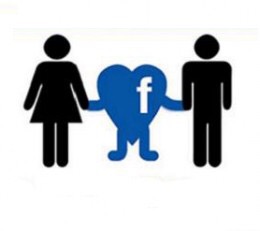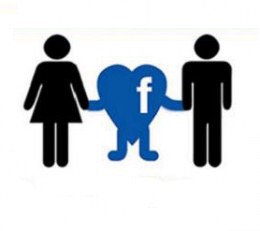
Nowadays, when someone who is dating makes a newly committed relationship official by updating it in their Facebook profile, it’s a BFD (big___ deal)!
Imagine! Now there is some social science behind this well-acknowledged fact!
A new research study from a University of Wisconsin-Madison professor that analyzed couples on Facebook delved into the psychology of this new social phenomenon.
It examined whether the act of couples sharing their relationship status on Facebook, posting photos of themselves with their partner or writing on each other’s wall was connected to the longevity of the relationship.
In a first of its kind research, Catalina Toma, an assistant professor of communications arts at Wisconsin, tracked dating couples over time in order to examine the link between how they present themselves on Facebook as a couple, and the stability of their relationship.
Toma used the “See Friendship” application (freely available on Facebook profiles) to document the Facebook activity of heterosexual college-aged dating couples.
Toma followed up six months later to find out if they were still together.
Results showed that, indeed, certain Facebook self-presentational elements were positively linked to participants’ relationship commitment and their likelihood of staying together with their partner.
For example, being listed as “in a relationship,” posting photos with their partner, and writing on their partner’s wall, were indicators of a healthy committed relationship .
“The claims people make about themselves in public are likely to be very influential in how they think about themselves,” says Toma, who studies online self-presentation and how emotional well-being is affected by social media. “Now we’re finding that these public self-presentations performed on Facebook also affect how people feel about a relationship partner.”
These presentations mean a lot on Facebook, in particular, because it is the place where people have accumulated a lot of family and friends, with whom people choose to share personal aspects of their lives.
“People declare their love, they make vows in front of friends and family, they take photographs, and they exchange rings,” Toma says. “Online claims are very meaningful psychologically, and I think a big reason for that is the access to this diverse and wide audience.”
Toma made some other surprising developments.
She discovered that couples who share more mutual friends may, in fact, be less committed.
“We think that having more mutual friends signals having a greater social network, and this greater network might include more alternative romantic partners,” Toma says.
Her research also found some double standards.
For example, survey participants interpreted their action of writing on a partner’s wall as an indicator of their commitment to their partner but at the same time, they also perceived a partner writing on their wall negatively, as sign of possessiveness or over-sharing.
Toma says although Facebook was originally designed as an online yearbook, it has evolved into something much more powerful. “Now we’re finding that it touches many aspects of our lives, including how we feel about ourselves and our romantic relationships.”
Isn’t this interesting?
Jay Jay Ghatt is also editor at Techyaya.com, founder of the JayJayGhatt.com and JayJayGhatt.com where she teaches online creators how to navigate digital entrepreneurship and offers Do-It-For-You Blogging Service. She manages her lifestyle sites BellyitchBlog, Jenebaspeaks and JJBraids.com and is the founder of BlackWomenTech.com 200 Black Women in Tech On Twitter. Her biz podcast 10 Minute Podcast is available on iTunes and Player.fm. Follow her on Twitter at @Jenebaspeaks. Buy her templates over at her legal and business templates on Etsy shop!

